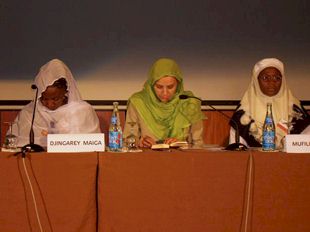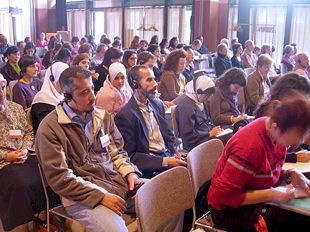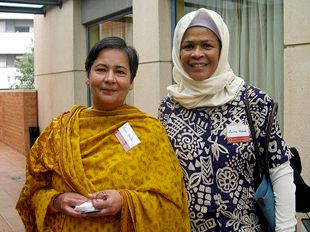___________________________________________________
1st
International Congress on Islamic Feminism: Conclusions
Muslim women denounce sexist interpretations of holy texts
feminismeislamic.org,
november 2005
____________________________________

Djingarey
Maiga (Mali), Yaratullah Monturiol (Catalunya), Mufuliat Fijabi (Nigeria)
Junta Islàmica Catalana organised this meeting, which for three days (october 27-29th, 2005) assembled over 400 delegates in Barcelona, with the intention of internationally disseminating the emergent movement of Muslim women for human rights, known as the "gender jihad". Another priority of the Congress was to initiate a collaboration between Muslim women and the global feminist movement.
During the course of the meeting, it became clear that Islamic feminism is a reality in many countries with a majority Muslim population. The Congress heard from women fighting for their rights and working in very difficult conditions against the implementation, in the name of Islam, of highly sexist and discriminatory family codes of behaviour.
Discussions were held on diversity and feminism, Koranic hermeneutics, Islamism and feminism, and other topics. There was also an exploration of the situation of Muslim women in South East Asia and Sub-Saharan Africa.
There
was a particularly moving moment when Amina Wadud, lecturer in Islamic
Studies at the Commonwealth University of Virginia (USA), gave the Friday
khutba (sermon) and led the mixed male/female audience in prayer.

Conclusions
Islamic
feminism is an emergent reality which must be seen as an alternative
to the dominant sexist readings.
This form of feminism derives from the Koranic revelation and is based
on the conviction that the Koran does not justify patriarchalism.
Islam can liberate women and change their current status. But for this,
the doors of ijtihad (interpretation work) must be opened, taking into
account the context of 21st century societies.
Help to change laws that discriminate against women.
Not confuse the laws drawn up by men with the broader concept of Sharia.
Men must be involved in women's struggle to achieve equal rights.
Seek support within communities to fight any form of discrimination.
Boost the participation of women in decision-making bodies.
Vindicate the right to own property, to individual freedom and economic
independence on the basis of Islamic tradition.
Demand access to the mosque as a Muslim women's right.
From the context of western countries, vindicate a status of full citizenship
for immigrant Muslim women. Family immigration laws must be altered.
The global feminist movement must take into account the diversity of
criteria and legitimate interpretations within Islam.
Call on non-Muslim feminists not to accept the most sexist and reactionary
sectors of Islam as the only possible interpretation of Islam. This
practice tends to hinder collaboration between Muslim women fighting
for their rights and the global feminist movement.
We can no longer accept the existence of a single, ethnocentric discourse
on "feminism". It is now necessary to speak of "feminisms".
Feminisms must be more inclusive and must accept the legitimacy of women's
struggles on the local and trans-national levels. The right to difference
and the specific nature of the various women's movements must be respected.
Networks must be built up to link, share and disseminate what we learn
from our own textual sources.
Strategies must be drawn up allowing us to bring this knowledge to all
women.
To avoid conflict, we must generate dialogue.
In the gaps in between, nobody has the habit: we must build together.
From shared knowledge, towards mutual acknowledgement.
Barcelona,
29th October 2005
http://www.feminismeislamic.org

Asma
Barlas (Pakistan) and Amina Wadud (USA)
____________
Related
article (in spanish):
Ndeye Andújar: "Reflexiones sobre el Congreso de Feminismo
Islámico" (25/11/2005)
http://www.webislam.com/default.asp?idt=2848
______________________________________________
oozebap . 2005 .
index